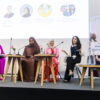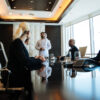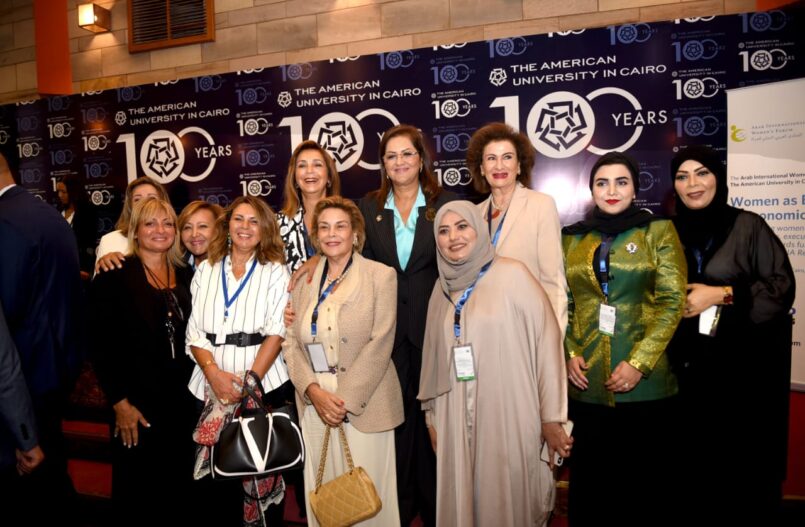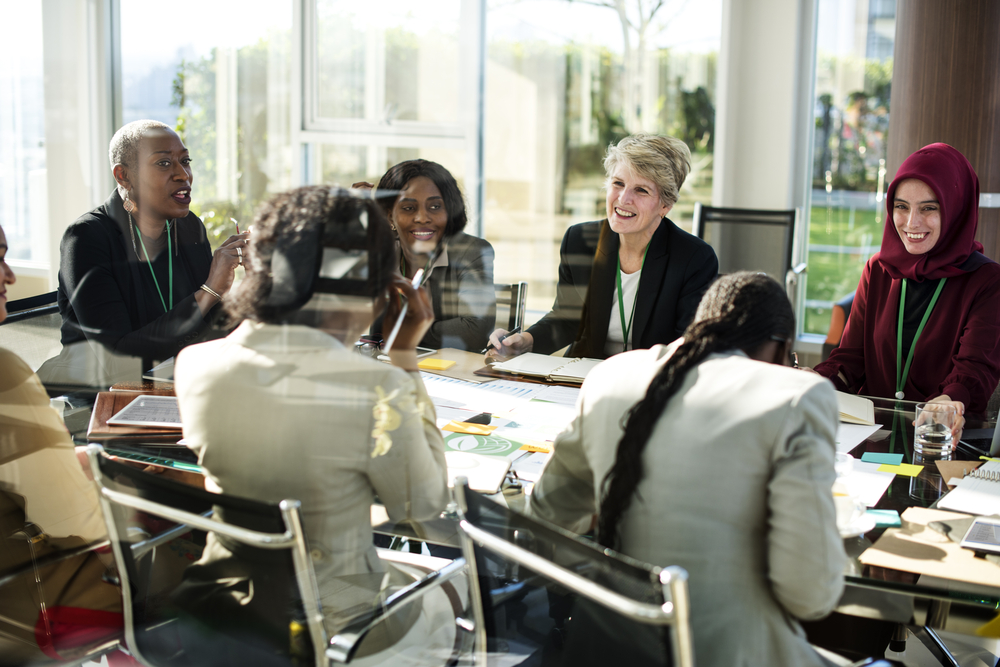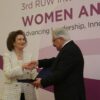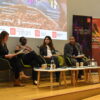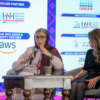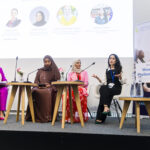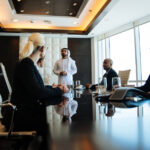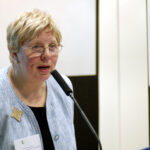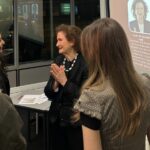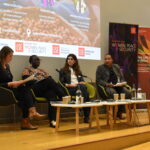The Arab International Women’s Forum is proud to share that its major conference Women as Engines of Economic Growth: Empowering women innovators, entrepreneurs, executives and educators towards fulfilment of the SDGs in the MENA Region was held on 16 & 17 September 2019 at and in partnership with the American University in Cairo, with PepsiCo as Lead Conference Partner and PwC Middle East as Conference Supporting Partner.
Women as Engines of Economic Growth brought into focus the vital contributions of women leaders to economic growth across the MENA States, and the importance of supporting their development in key positions in public institutions and companies, which is a key national priority in Egypt. Women’s leadership is at the core of the National Strategy for the Empowerment of Egyptian Women 2030, a rights-based approach grounded in the SDGs and Egypt’s Sustainable Development Strategy 2030, endorsed by the President in March 2017. The conference therefore elaborated on critical themes around women’s leadership in the economy, entrepreneurship and SME growth, on corporate boards and in family business, executive leadership, innovation and economic development. The programme also recognised women’s valuable role to the rural and agricultural sectors and identified successful strategies to strengthen women’s engagement in political life and public service, whilst emphasising the vital role of women in achieving legislative reform and gender balance in policy formation.
Taking forward the momentum that AIWF has created through recent and highly successful STEM-focused initiatives in Beirut (Women Leaders & Health in April 2019), Amman (Women, Water & Youth in September 2018), and London (Women-Led Innovation in STEM in September 2018), the Women as Engines of Economic Growth initiative represented a unique opportunity for women leaders in diverse sectors to convene at the American University in Cairo, a leading hub for academic excellence, innovation and research in the Arab world, to share perspectives on opportunities and challenges for women’s leadership, and examine current and emerging ‘future of work’ barriers to women’s participation in the economy, sustainability, political life and public service, in Egypt, the broader MENA region and internationally.
For this special initiative, AIWF welcomed Distinguished Guest Speakers representing the International Labour Organization, the League of Arab States, The World Bank, The American University in Cairo, the Egyptian Parliament, the National Council for Women in Egypt, PepsiCo Egypt, PwC Middle East, The GCC Boards Institute, the Economic Commission for Africa, the Anna Lindh Foundation, AFI Malaysia, Ashoka Arab World, the Geneva Water Hub at the University of Geneva, and Cairo University, among others. AIWF is deeply appreciative to all our Guest Speakers who generously contributed their time, expertise, invaluable experiences and professional insights to the success of the conference, to the compilation of this Special Report, and in shaping the 38 impactful and substantive Recommendations it delivers.
The Women as Engines of Economic Growth programme commenced with a special President’s Reception hosted on the evening of 16 September at Watson House, the private residence of the President of AUC, followed by the Conference Opening Session and four highly interactive and exceptionally well-attended Conference sessions held on 17 September 2019. As Conference Chair, Haifa Fahoum Al Kaylani, Founder & Chairman of AIWF, delivered the Conference Opening Keynote Address and welcomed Opening Session Guest of Honour Keynote Speakers: Francis J Ricciardone, President of AUC, HE Dr Hala El Said, Egypt’s Minister of Planning, Monitoring & Administrative Reform, Mohamed Shelbaya, Chairman & CEO of PepsiCo Egypt, and HE Dr Maya Morsy, President of the National Council for Women in Egypt.
In her Keynote Address, Mrs Al Kaylani said: “Women as Engines of Economic Growth comes at a pivotal time for women leaders in the MENA States and in Egypt, when we are witnessing greater involvement of women in the economy and in public office. We are all exceptionally proud of women’s achievements in these and all spheres, and we see their successes as key to addressing the empowerment challenges that remain. This is why AIWF took the lead on this initiative: to bring into focus the unprecedented opportunities for women to lead as drivers of economic change and growth in the Arab world and elaborate on how to develop those opportunities by working together to specifically address and overcome the challenges that remain.”
Mrs Al Kaylani continued, “AIWF is proud to have had this opportunity to partner with the American University in Cairo as part of AUC’s Centennial Celebrations in 2019 on Women as Engines of Economic Growth, a key opportunity to recognise women’s path-breaking achievements in the private sector, public office, entrepreneurship, academia and sustainability, and to move momentum forward on women’s economic empowerment in the wider Arab world. In all our discussions, we aimed to collaboratively construct a robust strategy and framework of recommendations to support women in reaching their full leadership potential, in all sectors and spheres. In doing this, we have all opened doors even wider for women’s economic participation across the region.”
Francis J Ricciardone, President of the American University in Cairo, shared in his Keynote Address that it was an honour to be hosting the AIWF conference at AUC: “I can think of no prouder way at AUC to be advancing through our Centenary Year than by marking it in our century of service to this country and the region with special emphasis on this topic of the conference, promoting men and women in equal measure as engines of national service, growth and development.” AUC, he said, is preparing students for an unpredictable future of work and social development and is committed to helping people “learn how to learn”, a statement which deeply resonated with many of the conference participants and several of the speakers who referenced these words in their later interventions throughout the day. President Ricciardone also restated the importance of connectivity, given AUC’s ethos as a global university and AIWF’s prominence in the international community as a truly international forum for women leaders.
HE Dr Hala El Said, Minister of Planning, Monitoring and Administrative Reform, shared that women’s organisational capacity and women’s access to paid work can transform the economic pathway, empower collective empowerment, active citizenship, entrepreneurship policy, access to finance and a variety of other non-financial services. Her Excellency said: “Empowerment helps to create a globally competitive private sector capable of success in an increasingly globalized economy and improve companies’ access to much stronger talent pools. We should build on this and not be ashamed to recognise where more work is needed. Our goals and aspirations must go beyond numbers and check boxes. We should accept no less than transforming institutional culture so we can access and capitalize on our full potential, creating an environment that embraces equality and is inclusive towards all our citizens. Our daughters,” said Dr El Said, “must grow up in a region where opportunity, access to resources and services is equal in every sense. This is a moral imperative and also the greatest potential economic stimulus in our economic future.”
Mohamed Shelbaya, Chairman & CEO of PepsiCo Egypt, conveyed how honoured he was to be part of the Women as Engines of Economic Growth programme at AUC with PepsiCo Egypt as Lead Conference Partner. He shared how proud PepsiCo are to be the Global Benefactor Partner of the Arab International Women’s Forum, calling the conference a “great forum to express thoughts and ideas on how to elevate women in Egypt. We are very proud of our partnership with AIWF that has continued for nearly ten years now. What has made the partnership so successful is that our goals are similar, and we share a common determination to break stereotypical views about women and bring greater public awareness of their capabilities and their potential in society and the workplace.”
HE Dr Maya Morsy, President of the National Council for Women in Egypt, focused her Keynote Address on strategies to mainstream all aspects of women’s empowerment. She said: “Women are the powerhouse because they are changing the mindset and the whole setup. Women have set the stage with key messages on the SDGs.” To women directly, Dr Morsy said: “A strong woman is one determined to do something others are not to do, to break the glass ceiling shatter and the walls that constrain you. Power will never be given to you. You must use your power and presence to claim it.”
Guest Speakers were all prominent and accomplished thought leaders, women’s advocates and change agents, entrepreneurs, social enterprise founders, senior professional women and policymakers representing non-profit organisations, international development agencies, academic institutions and private sector corporations. These included the International Labour Organization, the League of Arab States, The World Bank, The American University in Cairo, the Egyptian Parliament, the National Council for Women in Egypt, PepsiCo Egypt, PwC Middle East, The GCC Boards Institute, the Economic Commission for Africa, the Anna Lindh Foundation, AFI Malaysia, Ashoka Arab World, the Geneva Water Hub at the University of Geneva, and Cairo University, among others. AIWF was deeply impressed by the exceedingly high calibre of all our Panel Chairs, Distinguished Guest Speakers, and Conference Participants, all outstanding business, diplomatic and academic leaders who are most inspirational and accomplished in their fields, and who contributed at such a high level to the conference success.
The first panel of the day, Advancing women’s leadership and gender diversity on corporate boards and in family business: Best practices from Egypt, the broader MENA region and internationally, was chaired by Dr Ghada Howaidy, Associate Dean Executive Education and External Relations, School of Business, American University in Cairo, Egypt, and welcomed as Distinguished Guest Speakers Mona Al Moayyed, Managing Director, YK Almoayyed & Sons, Bahrain; Lilia Hachem Naas, Director of the Economic Commission for Africa (ECA) Office for North Africa, Morocco; Elisabeth Guigou, President, Anna Lindh Foundation, Egypt; and Jane Valls, Executive Director, The GCC Board Directors Institute, UAE.
Strategies to increase women’s representation on boards have gained considerable momentum in the last few years, which include “implementing quotas, setting voluntary targets, disclosing and increasing transparency in director appointments, and addressing unconscious bias”. There is less emphasis on regulation and quotas in corporate governance reform in the region, and more on developing Arab women to take on future board leadership roles, with some countries in recent years legislating to improve women’s participation on corporate boards and in executive leadership. There are also numerous NGOs and organisations in the region that are working closely with the private sector to strengthen corporate governance and promote the role of female leadership on corporate boards. The first session was accordingly dedicated to examining strategies for building awareness, educating, promoting opportunities and enhancing positive change in the community towards greater acceptance of women in business and corporate reform that brings more women leaders into the boardroom.
Panel 2, Women in entrepreneurship and SME development, the rural / agricultural sectors and the informal economy, was chaired by Nada El Agizy, Sustainable Development and International Cooperation Director, League of Arab States, Egypt, and was focused on strategies for empowering women in entrepreneurship, specifically in the rural industries, and for ‘formalising the informal’ economy. For many women in the Arab world, entrepreneurship has been a lifeline to economic inclusion. Some parts of the region are witnessing the exciting growth of networking organisations, online web communities, publications, entrepreneurship training and mentorship initiatives, as well as funding competitions specifically targeted at women entrepreneurs with a special focus on those in tech innovation and social enterprise. In other parts of the region, women in the rural and agricultural sectors face significant gender disparity, in entrepreneurship and in economic inclusion overall. On these key issues, the session welcomed the valued insights of Fatma El Zahraa Aglan, Agricultural Specialist, Agriculture and Food Global Practice, The World Bank, Egypt; Dr Iman Bibars, Vice President, Ashoka Global & Regional Director, Ashoka Arab World, Egypt; and Dr Salwa Bayomi El Magoli, Professor, Department of Food Science, Faculty of Agriculture, Cairo University, Egypt.
The third session of the day, Women in public service and leadership: Towards gender parity in parliament and women’s inclusion in policy making, was chaired by HE Mervat Tallawy, Former Director General, Arab Women Organisation & Former Egyptian Ambassador to Japan and Austria, who invited the Arab and international leaders on the panel to examine strategies for supporting women’s advancement in public life. The session was addressed by HE Jan Thesleff, Ambassador of Sweden to the Arab Republic of Egypt, who delivered a riveting Keynote on Sweden’s gender sensitive foreign policy which represents excellent best practice for the MENA Region. Guest Speakers on this inspired session included Dr Heba Hagrass, Member of Egyptian Parliament, Egypt; Natasha Carmi, Lead Water Specialist, Geneva Water Hub, University of Geneva, Switzerland; Almas Jiwani, President Emeritus UN Women Canada NC & CEO Almas Jiwani Foundation, Canada; Frida Khan, Senior Specialist, Non-Discrimination and Gender Equality International Labour Organization Regional Office for the Arab States, Lebanon; and Helen Walbey, Head of Gender Inclusive Finance, AFI Malaysia.
The final panel of the day, Reflections on the future of work for women and young people in the MENA Region, examined development challenges that the Arab private and public sectors will urgently need to address in order to adequately prepare the Arab workforce for a ‘future of work’ that will be irrevocably changed by technology, automation and AI. The panel was chaired by Haifa Al Kaylani, who was the only Commissioner from the Arab world to be invited to contribute to the ILO Global Commission on the Future of Work, and was addressed by Deborah Greenfield, Deputy Director General for Policy, International Labour Organization (ILO), Switzerland; Dr Afef Haddad, Deputy to the Country Director, Country Program Coordinator Maghreb and Malta, The World Bank, USA; David Suarez, People and Organisation Middle East Leader, PwC Middle East, UAE; Dr Haleama Al Sabbah, Associate Professor & Chair of the College of Natural and Health Sciences, Zayed University, UAE; and Dr Nagla Rizk, Professor, Department of Economics & Founding Director, Access to Knowledge for Development Center, American University in Cairo, Egypt.
The themes of the Women as Engines of Economic Growth Conference are at the heart of what AIWF has been leading with at the Arab and international level for nearly 19 years with the invaluable support of all our Global Partners. AIWF now looks forward to working closely with all our Conference Partners and Stakeholders to set a new standard for women’s empowerment in the MENA region and beyond, and action the many valuable recommendations that emerged from the day’s conference discussions which are documented in the AIWF Special Report on Women as Engines of Economic Growth which AIWF was proud to publish in November 2019.

